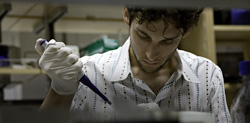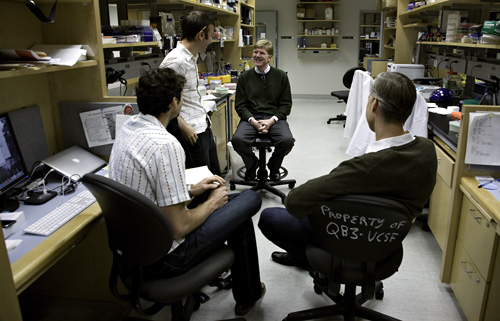
Nicholas Toriello, vice president of operations and co-founder of Allopartis Biotechnologies, at his lab bench in the QB3 Garage.
Douglas Crawford, PhD, knows that when it comes to parenting, there’s a time for patience, a time for praise and a time for tough love.
Of course, in Crawford’s case, the “kids” are biotech start-ups that have taken up residence outside his UCSF office as they work to develop their technological innovations and woo investors.
Crawford is the associate executive director of the California Institute for Quantitative Biosciences (QB3), located at the UCSF Mission Bay campus. Along with his many other duties, he supervises the QB3 Garage, an incubator that allows up to six nascent companies at a time access to state-of-the-art laboratory space as they try to gain a foothold in California’s world-renowned biotech community.
Due to the high demand, admission is currently restricted to individuals who are affiliated with QB3 or the University of California. In addition, the entrepreneurs are limited to two years at the Garage before they are required to make room for a new batch of hopefuls.
“We’re not a small intensive care unit for companies; we’re a real incubator: We put eggs in and take chicks out,” Crawford said during a recent tour of the facility. “We want companies to receive funding and then leave as quickly as possible.”
So far, the Garage has housed 10 companies, four of which have received Series A funding, the first round of venture funding. Another company, True Materials Inc., was acquired last summer for $25 million by the Santa Clara-based genetic test systems company Affymetrix Inc.
Only one company out of the 10 has failed so far, Crawford said – a success rate he is extremely proud of.
Located behind a nondescript door in Byers Hall, the Garage is a 2,500-square-foot cluster of offices and a communal lab. As of early February, four companies were renting space and Crawford was in talks with a fifth.

Douglas Crawford, PhD, center, director of Industrial Alliances and associate executive director at the California Institute for Quantitative Biomedical Research (QB3) at UCSF, chats with Allopartis Biotechnologies entrepreneurs at the QB3 Garage, from left, Nicholas Toriello, vice president of operations and co-founder; Charles Emrich, chief scientific officer and co-founder; and Robert Blazej, president and acting CEO, and co-founder.
One current tenant, Simprota Corp., has been at the Garage since December 2007. The company was founded by Ilya Chorny, PhD, a former member of the research lab of UCSF biophysicist Ken Dill, PhD, which specializes in computational biology and statistical mechanical modeling.
Simprota uses computer-aided modeling to understand how peptides and proteins work and to aid in the design of new therapeutics, diagnostics and materials. So far, its revenue has come from various biotech and pharmaceutical companies that have made use of its services, and Chorny is still working to raise first-round venture funding, he said.
Being housed at the Garage has facilitated that process by bringing Chorny and the other tenants in frequent contact with investors looking for new opportunities, Chorny said.
“I don’t think I would have had that kind of exposure if I just rented an office downtown or in an office park,” he wrote in an email message, adding that he believes being affiliated with QB3 has given his company greater “legitimacy.”
Investing in Start-ups
Despite the Bay Area’s reputation as a hotbed of biotech innovation, there are only a few biotech incubators available to entrepreneurs, and none quite like the Garage, Crawford said. Unlike most other facilities, he said, the Garage can rent micro amounts of space, allowing its tenants to rent only what they need and to expand when necessary – an option that significantly lowers the overall cost to the often cash-strapped companies.
“We’re offering a place where a scientific idea can transform into a well-funded, venture-backed business,” he said. “While they are here, [the companies] can create a product that is appealing to venture capitalists, and they can collaborate with UC faculty and QB3 investigators at the same time.”
Crawford said he would love to see the Garage model replicated elsewhere in California and the rest of the country, especially in science buildings throughout the various UC campuses.
The potential benefit of investing in these start-ups is significant and far-reaching, he said, noting that the majority of the Garage companies are working on therapies, diagnostics or research tools aimed at improving health.
“If this part of the process is broken, then our ability to help patients is broken,” he said of the transition from promising idea to prototype.
In addition, the Garage offers a source of encouragement and inspiration for aspiring entrepreneurs, Crawford said.
“It’s great for our students, faculty and staff to see that it’s not impossible to take an idea and start a successful company,” he said.
QB3, one of four California Institutes for Science and Innovation created by the state of California, is a partnership of UCSF, UC Berkeley and UC Santa Cruz. It aims to help accelerate the transfer of biomedical innovations to the marketplace.
Photos by Susan Merrell
Related Links:
QB3 Garage
Simprota Corporation
QB3 “Garage” for Biotech Start-ups Offers Look Inside
UCSF Today, Sept. 21, 2006

